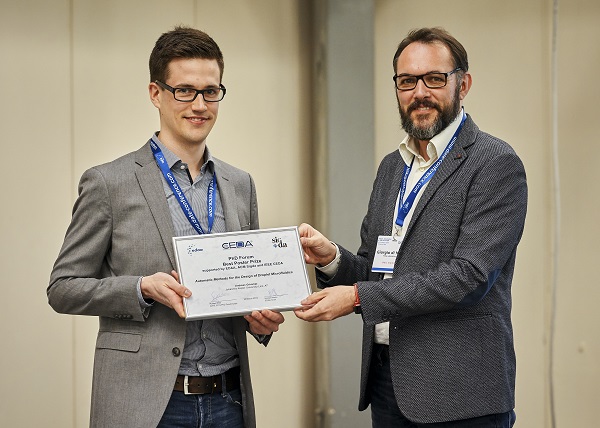A JKU computer scientist was presented with an award at the Europe’s largest and most important design automation conference.

When it comes to medical testing, how can you put a complex and expensive lab on to a single chip? The solution is a so-called Lab-on-a-Chip. However, designing one requires just the right design methods. JKU doctoral candidate Andreas Grimmer has developed a method as part of his doctoral dissertation – and was presented with an award at the PhD forum at the “Design, Automation and Test in Europe” (DATE) conference.
When it comes to conducting medical tests, nearly all tests are analyzed at state-of-the-art labs. Experts in the lab analyze substances using complex equipment, expensive chemicals, and require a high level of human resources. The so-called Labs-on-a-Chip, however, provide an alternative to conduct the same medical test but fully-automated, at a much lower cost, and using less substances. Typical lab work such as mixing, heating, incubating, etc. and can be carried out on a chip only a centimeter in size rather than in a large lab. Samples such as blood, urine or other secretions as well as the required chemicals only have to be available in volumes of a few nanoliters. This means that an entire, fully-equipped lab can ‘shrink’ to the size of a single, portable chip – the perfect platform to conduct fully automated tests quickly and anywhere.
Designing a Lab-on-a-Chip is highly complicated. The design must determine just how the channels holding the samples will be dimensioned and connected, which pressure liquids will be injected in to the chips, and how any heating, mixing or diluting will be done. This kind of work has always been done manually - a tedious procedure which often does not lead to the desired results and must be repeated regularly. Under the direction of Prof. Robert Wille, the team at the JKU’s Institute for Integrated Circuits have developed automated processes to solve many of these problems ‘at the push of a button’. Scientists combine skills in computer science with expertise in fluid mechanics and medicine.
Andreas Grimmer has been conducting research in these methods since 2016 and in only three years, he has been able to develop numerous procedures that can, for example, reduce the design time of an individual chip from over one month to just a single day. Dr. Grimmer successfully defended his dissertation titled “Automatic Methods for the Design of Droplet Microfluidic Networks: A Toolbox for Designers” in January of this year and won the “Best Poster Prize” at the DATE PhD forum. DATE is one of Europe‘s most important design automation conferences, attracting over 1000 scientists and industry representatives. The PhD Forum at DATE gives doctoral candidates from around the world an opportunity to present their dissertations to a professional audience.








